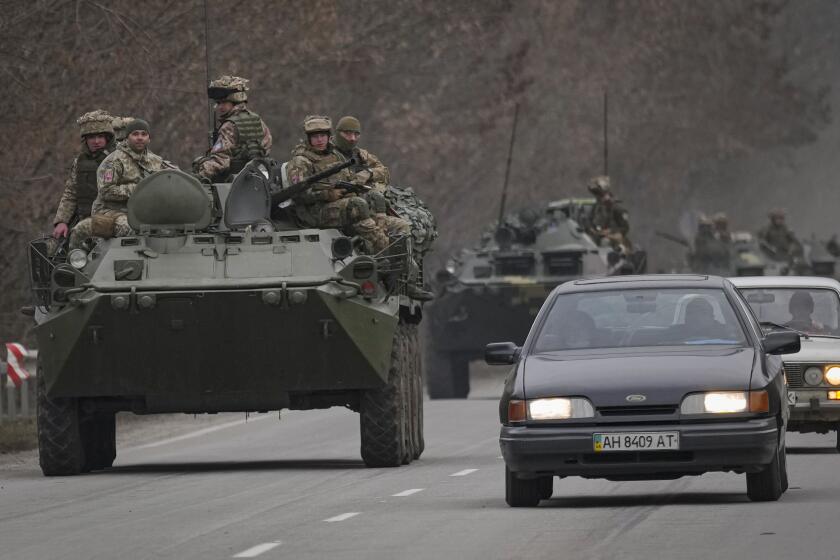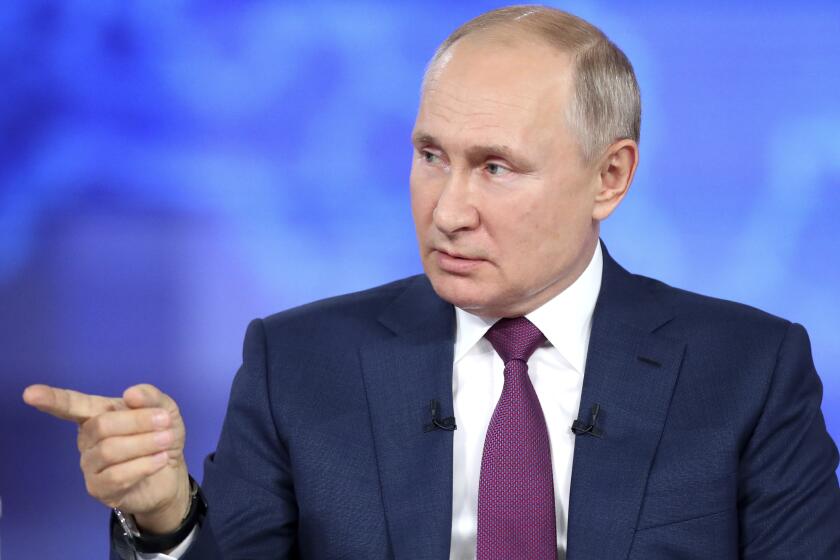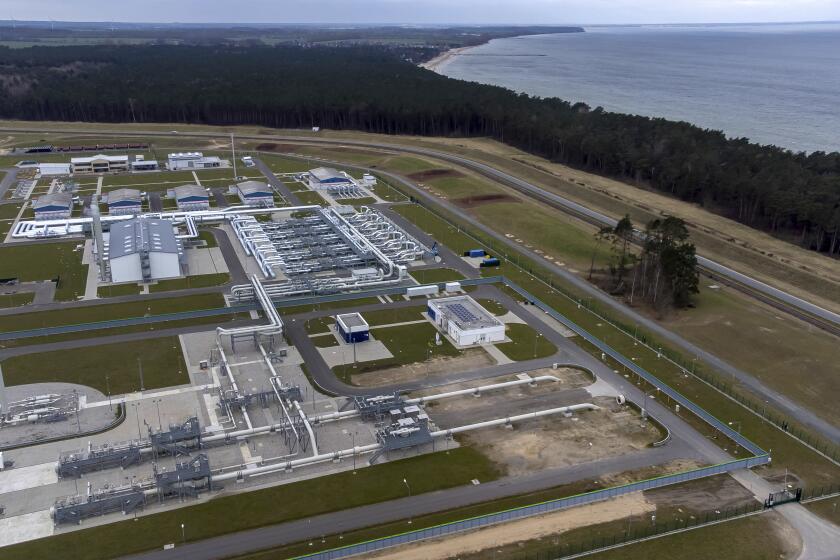Why Western sanctions aren’t hitting Russia where it would hurt the most: Oil and gas

- Share via
WASHINGTON — Even as the United States and its allies have hammered Russia’s economy in response to the invasion of Ukraine, they have held back perhaps the most powerful weapon in their arsenal: a total embargo on oil and gas.
Blocking energy exports and payments to Russia is considered by some analysts as the ultimate step in an escalating sanctions campaign being imposed by the West. An embargo would threaten the very lifeline of the country’s already tottering economy.
About half of Russia’s total revenue comes from sales of oil and gas, the lion’s share from Western Europe. Cutting off that income to the Russian economy would put enormous pressure on President Vladimir Putin.
So why haven’t the U.S. and Europe done it?
For starters, it would wreak even more hardships on the Russian people. And the pain inflicted on ordinary citizens could have the unintended consequence of rallying them behind their leader.
But the broader reason is that Western nations, and particularly the Biden administration, are attempting to find a careful balance between punishing Putin and avoiding serious economic and political blowback back home.
Russian tanks and troops crossed into Ukraine on Thursday after a night of shelling. But why is Russia attacking Ukraine? What is Putin’s goal?
A cutoff of Russia’s energy industry would impose severe consequences for U.S. allies in Europe, at least in the near term, and for Americans as well.
The disruption of global energy markets and the subsequent surge in oil and gas prices would likely add to inflation that’s already at a 40-year high. And government efforts to fight the new burst of inflation would risk triggering a recession on the eve of the U.S. midterm elections.
Although the U.S. is largely energy independent — it’s the world’s largest producer of oil and liquefied natural gas — crude oil prices are set in a global market.
Putin’s invasion of Ukraine came at a moment of tightening energy supplies and rising prices. As economies recover from the long pandemic, oil producers have been struggling to keep up with pent-up demand from consumers in the U.S. and elsewhere.
Biden, mindful of the pocketbook impact on consumers and his own low approval ratings, would almost certainly try to limit the impact of an embargo by releasing the U.S.’ strategic reserves and pushing big producers like Saudi Arabia to pump out more oil.
The European Union is weighing sanctions on some of Russia’s wealthiest and most influential business people, according to documents seen by Bloomberg.
Western allies could even race to finish a new nuclear arms treaty with Tehran, freeing up a million or so barrels of Iranian oil a day that are now embargoed.
But analysts don’t think that would be enough.
Russia is among the world’s top three producers of oil and natural gas, and while its exports account for a seemingly small 5% of the global market, a full removal of that supply could lead to a doubling of energy prices, said Joseph Gagnon, senior fellow at the Peterson Institute for International Economics in Washington.
Already benchmark petroleum prices have jumped in the last month, climbing above $100 a barrel, an eight-year high. American consumers in mid-February were paying on average $3.53 a gallon, a buck more than just a year earlier.
Longer-term, analysts worry that an embargo of Russian energy could fundamentally reshape the international market along geopolitical lines. Russian oil and gas could end up being permanently shifted to China, India and other countries in Asia.
Russia, supplier of about 10% of the world’s oil and more than 15% of its gas, increasingly will be going it alone, with Western petroleum companies exiting over the Ukraine invasion.
“I think we’re in danger of seeing a financial iron curtain being reestablished,” said Jim Krane, a research fellow at Rice University’s Baker Institute in Houston. “If we set up these barriers to trade between Russia and the West again, and then Russia reorients itself toward friendly countries like China, that could be a really damaging turn of events.”
Europe would suffer the most, he added.
“Russia has traditionally been the energy supply hinterland for Europe,” Krane said. “It’s geographically connected to Europe. It’s got fantastic east-west trade routes to Europe. And for these two to lose each other as trading partners, that’s a big loss.”
A significant wild card is China, the world’s second largest economy. China and Russia have appeared to be having their closest relations in decades, but some analysts believe that Chinese President Xi Jinping was surprised by Putin’s outright invasion of Ukraine.
“I think Xi feels that he’s been played [by Putin]. He’s been put in a difficult situation,” said Nicholas Lardy, a China expert at the Peterson Institute.
As a result, Beijing may limit its support for Moscow. And in the event of an embargo, that means China may not go beyond its current energy purchases to help offset lost sales to the West.
Instead of dividing Western allies as Putin intended, the Russian invasion has produced extraordinary unity and almost overnight agreement on a wide range of financial sanctions and export bans that have led a growing number of Western companies to shun business or investment in Russia.
Some of the new sanctions against Russia have a real bite, particularly the measure freezing much of the Russian central bank’s $630 billion in reserves held in foreign currencies.
The West also sought to hobble Moscow’s financial system by ejecting some Russian lenders from SWIFT, the international messaging system that is used to communicate and facilitate payments among more than 11,000 banks.
But the SWIFT and other sanctions targeting Russian lenders generally carve out exclusions for transfers involving Russia’s energy exports. And the action against Russia’s central bank also does not, in itself, block the country from exporting and earning income from energy supplies, and accessing those funds.
Worried that higher oil and gas prices will fuel Putin’s war chest, Ukrainian officials have called for a full embargo of Russian energy, which Europe relies on for about 40% of natural gas — and considerably more for countries such as Germany, Poland and Bulgaria.
There is little apparent appetite so far for such a move. Yet a cutoff of Russian energy supplies could still happen — by Russia itself, to punish the West for the other sanctions.
Some European leaders might even prefer Russia make that decision, to avoid being blamed by voters, said analysts.
“If nothing else, it has to be his fault,” said Jonathan Hackenbroich, policy fellow at the European Council on Foreign Relations in Berlin.
One big question is how much pain and sacrifice ordinary citizens are willing to absorb if the crisis drags on. That’s true on both sides of the Atlantic.
Europe is coming out of peak winter demand for natural gas, which could bring some relief. The U.S. and other member nations of the International Energy Agency said Tuesday they would join in a rare coordinated release of 60 million barrels of strategic oil stockpiles to help offset disruptions wrought by Russia’s invasion.
And then there’s the issue of the impact on Russia. Embargoes are not easily lifted. And over the long haul, an economic breakdown of a nuclear power is hardly in the best interests of the West and global security.
“In the longer term, it might not be helpful to provoke a destabilization of the Russian economy. We might find that we need to stabilize the oil and gas sector in Russia in order to ensure the economic and political stability of Russia,” said Antoine Halff, research scholar at Columbia University’s Center on Global Energy Policy.
He added: “It’s quite likely that this conflict, whatever the outcome might be, is going to be very transformative for the energy market and for the world. When the dust settles, I think the world will look very different from what it looks now.”
More to Read
Get the L.A. Times Politics newsletter
Deeply reported insights into legislation, politics and policy from Sacramento, Washington and beyond. In your inbox three times per week.
You may occasionally receive promotional content from the Los Angeles Times.














